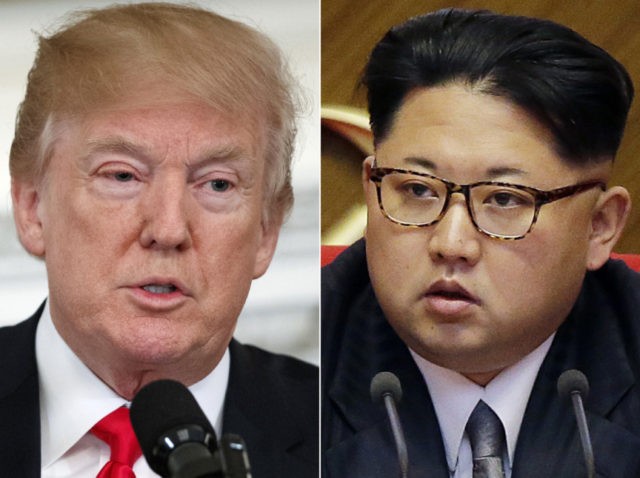North Korea’s state-run KCNA news service declared on Tuesday that a peace treaty to formally conclude the Korean War “can never be a bargaining chip” for ending Pyongyang’s nuclear weapons program and suggested the United States must decide if it truly wants a treaty.
The U.S. and South Korea have expressed interest in a peace treaty to end the Korean War, which is technically on hold since the 1953 armistice, but there are concerns North Korea would use such a treaty to weaken international sanctions and push for the removal of American troops from the Korean peninsula. The Trump administration views the peace treaty as a goal to pursue after denuclearization has reached certain verifiable milestones.
KCNA said on Tuesday the peace treaty issue should have been “resolved half a century ago” and insisted the treaty is necessary to move forward with improving relations between North Korea and the United States.
The North Korean media outlet also insisted Pyongyang has taken “substantial and crucial steps” to implement the denuclearization commitment leader Kim Jong-un made at his summit with U.S. President Donald Trump and deserves to be rewarded.
“The U.S. is still trying to subdue someone by resorting to sanctions,” KCNA grumbled.
South Korea’s Yonhap News noticed on Tuesday that North Korean media has been curiously reluctant to admit Foreign Minister Ri Yong-ho met with American and Japanese officials on the sidelines of the U.N. General Assembly last week, even as state newspaper Rodong Sinmun boasted of all the other national delegations and U.N. officials Ri met with.
Rodong Sinmun praised Ri for discussing “improved bilateral relationships” with countries like China, Russia, Venezuela, and Brazil, but avoided mentioning his meetings with U.S. Secretary of State Mike Pompeo and Japanese Foreign Minister Taro Kono. Ri’s meeting with Pompeo drew a great deal of media coverage outside North Korea due to Pompeo’s subsequent announcement that he would visit Pyongyang in October to set up another summit between Kim and Trump.
“Watchers say the Pyongyang media may have intentionally dropped Ri’s contact with the U.S. and Japan due to the sensitivity of the North’s relations with the two countries. They speculate that Pyongyang seems to have concluded that it’s too early to let the North Korean people know the progress of its tug-of-war with the U.S. over denuclearization,” Yonhap News speculated.
Yonhap mentioned the KCNA editorial on the peace treaty and its theme that the ball is squarely in America’s court to suggest North Korean media is essentially managing expectations, keeping citizens in the dark until the Kim regime has big triumphs to announce.
South Korean Unification Minister Cho Myoung-gyon gave an estimate of between 20 and 60 functional North Korean nuclear bombs to parliament on Monday. This falls in line with estimates made by various other nations, including the United States, but the South Koreans have been reluctant to comment on the size of the North’s nuclear arsenal. In fact, NBC News suggested on Tuesday that Cho accidentally let the number slip under questioning by lawmakers.

COMMENTS
Please let us know if you're having issues with commenting.